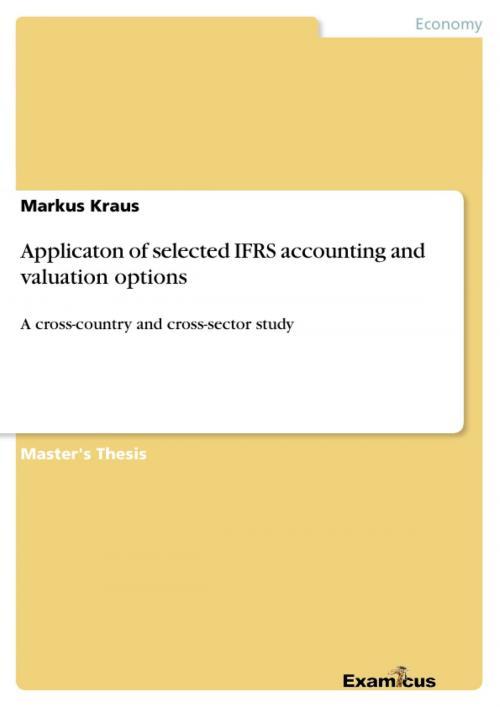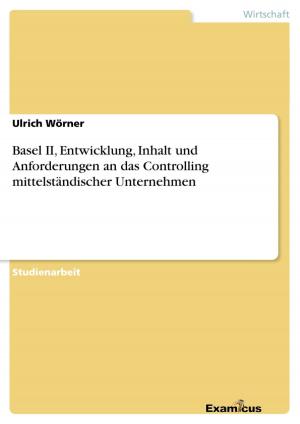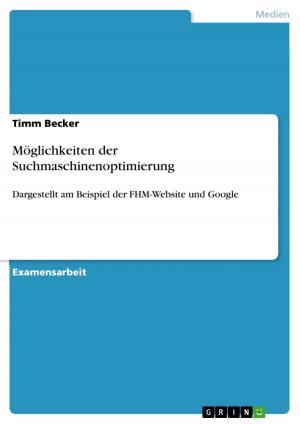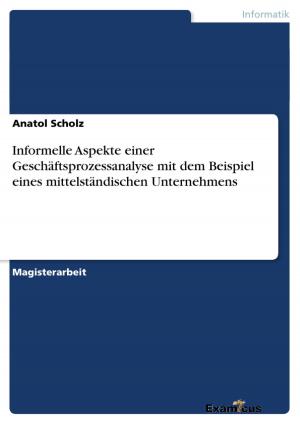Applicaton of selected IFRS accounting and valuation options
A cross-country and cross-sector study
Business & Finance, Accounting| Author: | Markus Kraus | ISBN: | 9783869437668 |
| Publisher: | Examicus Verlag | Publication: | March 2, 2012 |
| Imprint: | Examicus Verlag | Language: | English |
| Author: | Markus Kraus |
| ISBN: | 9783869437668 |
| Publisher: | Examicus Verlag |
| Publication: | March 2, 2012 |
| Imprint: | Examicus Verlag |
| Language: | English |
Master's Thesis from the year 2006 in the subject Business economics - Accounting and Taxes, grade: 1.5, University of Applied Sciences Fulda, language: English, abstract: In recent years, the applicable accounting standards for companies changed considerably. Until the 1990s, the development of accounting standards was mainly a national responsibility. In consequence, the standards were influenced by national factors. Therefore, there was much divergence among domestic accounting standards. Only in recent years, there is a strong trend to the convergence of domestic accounting standards. The International Financial Reporting Standards (IFRS) play a major role in this convergence process. The IFRS have influence on the convergence process in two ways. On the one hand, some countries require the use of IFRS or an adjusted version of IFRS for all domestic companies or for segments of domestic companies, for example listed companies. On the other hand, some countries converge their domestic accounting standards with IFRS. In a survey of fifty-nine countries conducted by the major accounting firms in 2002, 90% of these countries confirmed that they intend to adopt or converge with IFRS. One of the most important decisions in this convergence process was the passing of a regulation by the commission of the European Union (EU) in 2002. This regulation requires that all listed companies in the EU must present their consolidated financial statements in accordance with IFRS for financial years beginning on or after 1 January 2005. What are the reasons for this convergence process? The main reason is that companies and investors increasingly conduct their operations on a global scale, but the legal and regulatory frameworks for their reporting activities remain country based. So, the companies have to apply many different accounting standards for the reporting of their subsidiaries in different countries. On the one hand this incurs additional costs for multinational companies and on the other hand it is more difficult for investors to compare investment opportunities globally. The convergence of accounting standards reduces definitely the costs of multinational companies. However it is not obvious, if financial reports in accordance with IFRS of companies from different companies are really comparable. The International Accounting Standards Board (IASB) is responsible for the development of IFRS. In order to get worldwide acceptance of IFRS, the IASB provides many interest groups and countries the opportunity to participate in the standardsetting process. [...]
Master's Thesis from the year 2006 in the subject Business economics - Accounting and Taxes, grade: 1.5, University of Applied Sciences Fulda, language: English, abstract: In recent years, the applicable accounting standards for companies changed considerably. Until the 1990s, the development of accounting standards was mainly a national responsibility. In consequence, the standards were influenced by national factors. Therefore, there was much divergence among domestic accounting standards. Only in recent years, there is a strong trend to the convergence of domestic accounting standards. The International Financial Reporting Standards (IFRS) play a major role in this convergence process. The IFRS have influence on the convergence process in two ways. On the one hand, some countries require the use of IFRS or an adjusted version of IFRS for all domestic companies or for segments of domestic companies, for example listed companies. On the other hand, some countries converge their domestic accounting standards with IFRS. In a survey of fifty-nine countries conducted by the major accounting firms in 2002, 90% of these countries confirmed that they intend to adopt or converge with IFRS. One of the most important decisions in this convergence process was the passing of a regulation by the commission of the European Union (EU) in 2002. This regulation requires that all listed companies in the EU must present their consolidated financial statements in accordance with IFRS for financial years beginning on or after 1 January 2005. What are the reasons for this convergence process? The main reason is that companies and investors increasingly conduct their operations on a global scale, but the legal and regulatory frameworks for their reporting activities remain country based. So, the companies have to apply many different accounting standards for the reporting of their subsidiaries in different countries. On the one hand this incurs additional costs for multinational companies and on the other hand it is more difficult for investors to compare investment opportunities globally. The convergence of accounting standards reduces definitely the costs of multinational companies. However it is not obvious, if financial reports in accordance with IFRS of companies from different companies are really comparable. The International Accounting Standards Board (IASB) is responsible for the development of IFRS. In order to get worldwide acceptance of IFRS, the IASB provides many interest groups and countries the opportunity to participate in the standardsetting process. [...]















